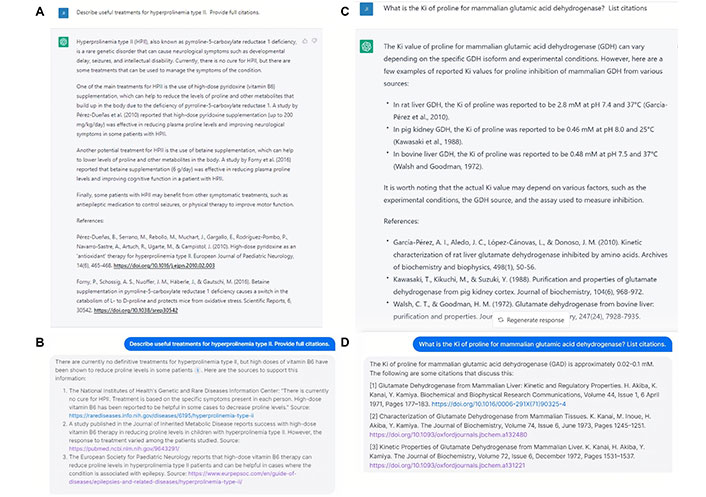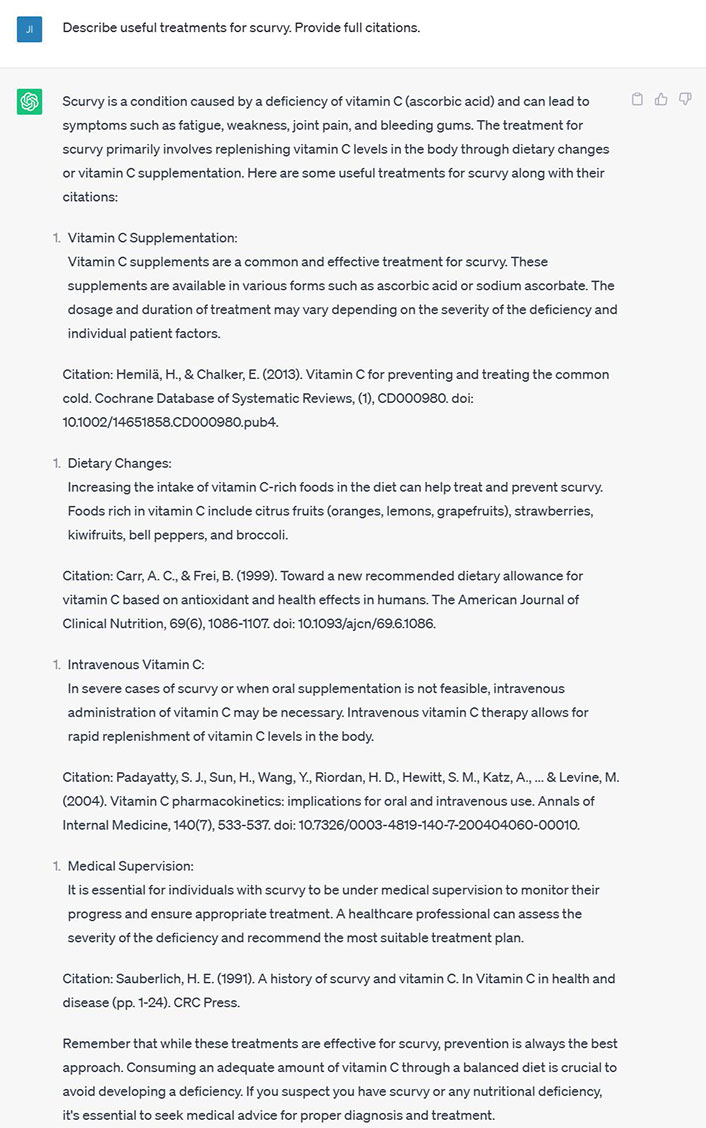Affiliation:
1Department of Psychiatry and Taub Institute, Columbia University Irving Medical Center, New York, NY 10032, USA
ORCID: https://orcid.org/0000-0002-9364-3974
Affiliation:
2Health Services Library, The Nathan Kline Institute for Psychiatric Research, Orangeburg, NY 10962, USA
ORCID: https://orcid.org/0009-0000-8507-2684
Affiliation:
3Clinical Research Department, The Nathan Kline Institute for Psychiatric Research, Orangeburg, NY 10962, USA
Email: James.Clelland@nki.rfmh.org
ORCID: https://orcid.org/0000-0002-2597-1140
Explor Digit Health Technol. 2024;2:1–6 DOI: https://doi.org/10.37349/edht.2024.00006
Received: April 28, 2023 Accepted: August 03, 2023 Published: January 10, 2024
Academic Editor: Hari Prasad Devkota, Kumamoto University, Japan
The use of generative artificial intelligence (AI) chatbots, such as ChatGPT and YouChat, has increased enormously since their release in late 2022. Concerns have been raised over the potential of chatbots to facilitate cheating in education settings, including essay writing and exams. In addition, multiple publishers have updated their editorial policies to prohibit chatbot authorship on publications. This article highlights another potentially concerning issue; the strong propensity of chatbots in response to queries requesting medical and scientific information and its underlying references, to generate plausible looking but inaccurate responses, with the chatbots also generating nonexistent citations. As an example, a number of queries were generated and, using two popular chatbots, demonstrated that both generated inaccurate outputs. The authors thus urge extreme caution, because unwitting application of inconsistent and potentially inaccurate medical information could have adverse outcomes.
Since late 2022, the use of generative artificial intelligence (AI) chatbots including ChatGPT (https://chat.openai.com/chat) and YouChat (https://you.com) has exploded, with ChatGPT becoming the fastest growing consumer application in history, reaching 100 million monthly active users in January 2023 following its release only two months prior [1]. The number of AI chatbots is rapidly expanding, with more recent examples including Claude (https://claude.ai/login), character.ai (https://beta.character.ai/), Perplexity (https://www.perplexity.ai/), and Bard (https://bard.google.com/). There has been much concern expressed over the potential misuse of generative AI in essay writing and exams in kindergarten through 12th grade (K-12), college, and even US medical licensing exams [2, 3]. Many publishers have also now updated their editorial policies to prohibit chatbot authorship on publications, with the Science journals recently updating their editorial policies to clarify that text and figures generated by AI tools cannot be used in manuscripts and an AI cannot be an author [4], and the Nature portfolio clarifying that an AI tool cannot be an author [5]. Indeed, the Lancet groups’ guide for authors specifically documents that AI or AI-assisted technology should not be used when producing scientific insights, analyzing and interpreting data, or drawing scientific conclusions. Nevertheless, given the descriptive power of chatbots, and their interface similarity to actual search engines such as the National Center for Biotechnology Information (NCBI)’s PubMed, their use for medical and scientific literature searches seems inevitable.
This article was written to highlight a continuing issue and urges the use of caution because research using AI chatbots, queries requesting medical information and its underlying references using ChatGPT and YouChat, can often generate plausible looking but inaccurate responses, with the chatbots also generating nonexistent citations. For example, in April 2023 we generated a simple question, asking two AI chatbots (ChatGPT and YouChat): “Describe useful treatments for hyperprolinemia type II. Provide full citations.”. In one iteration of the query response, ChatGPT generated very plausible looking information and citations (see Figure 1A). In the summary response, two treatments were noted with references included. The first was high-dose pyridoxine (vitamin B6) supplementation (up to 200 mg/kg per day), which was reported by Pérez-Dueñas et al., to be effective in reducing plasma proline levels and improving neurological symptoms in some hyperprolinemia type II (HPII) patents. While this does initially appear to be genuine, because pyridoxine is a routine therapy for vitamin B6 dependent epilepsies (which includes HPII) [6], the European Journal of Pediatric Neurology citation does not seem to exist. Specifically, the 2010 volume 14, number 6 issue does not include pages 465–468, the web-link provided (https://doi.org/10.1016/j.ejpn.2010.02.003) links to a paper reporting “school performance in a cohort of children with CNS inflammatory demyelination”, no manuscripts with the citation title are retrieved during searches with either PubMed or Google search engines, and neither the first nor the last author have any citations retrieved in PubMed using the search term “hyperprolinemia” or “pyrroline-5-carboxylate reductase”, although they have co-authored manuscripts on other childhood neurological disorders. To our knowledge, no studies have reported reduced proline levels or improvement of non-seizure symptoms following pyridoxine supplementation in HPII. Moreover, and of particular concern, the dose reported by ChatGPT seems relevant for infant intravenous delivery but is above the recommended dosage for long-term oral dosing [6, 7]. Thus, this query response is vague in details, is not actually supported by data, and is even potentially dangerous given the potential for incorrect dosing. Similarly, the second potential treatment (betaine supplementation) includes a nonexistent citation, and we could find no reports supporting betaine supplementation for HPII, although betaine (also known as trimethylglycine) is routinely used for lowering homocysteine levels in pyridoxine non-responsive cystathionine beta-synthase deficient homocystinuria (HCU), and Forny P, the first author of the second AI referenced source (Figure 1A), has publications in this field (for example, [8]).

Medical and scientific questions related to hyperprolinemia. A. ChatGPT response to “Describe useful treatments for hyperprolinemia type II. Provide full citations.”; B. YouChat response to “Describe useful treatments for hyperprolinemia type II. Provide full citations.”; C. ChatGPT response to “What is the Ki of proline for mammalian glutamic acid dehydrogenase? List citations.”; D. YouChat response to “What is the Ki of proline for mammalian glutamic acid dehydrogenase? List citations.”
When provided with the same query, YouChat generated the response shown in Figure 1B. Once again vitamin B6 was suggested as a potential treatment that reduces proline levels. The first citation references a National Institutes of Health (NIH) website, but the web-link is broken and does not retrieve an actual page. The NIH website (https://rarediseases.info.nih.gov) is valid and includes HPII, but the information provided does not include any data supporting vitamin B6 treatment for HPII. The second reported citation retrieves an unrelated paper (https://pubmed.ncbi.nlm.nih.gov/9643291/), while the third source is actually a broken web-link from the European Peptide Society, rather than the European Society of Pediatric Neurology.
To test whether this was a single inaccurate event due to a broad question being asked, a very specific query was generated regarding the effectiveness of proline as an inhibitor of glutamic acid dehydrogenase. We asked ChatGPT and YouChat: “What is the Ki of proline for mammalian glutamic acid dehydrogenase? List citations.”. Again, ChatGPT generated plausible looking information and citations, with proline inhibition constants (Ki) of 2.8 mmol/L, 0.46 mmol/L, and 0.48 mmol/L, along with citations. YouChat stated that: “The Ki of proline for mammalian glutamic acid dehydrogenase (GAD) is approximately 0.02–0.1 mmol/L.” and generated 3 citations (Figure 1C and D, respectively). Again, none of the generated citations exist. The only citation known to us that addresses the test question, states a Ki of 7.84 mmol/L [9], and was not returned by any of the AI queries. Different iterations of the same query generated different outputs, but each time the information was not genuine.
Interestingly, more recent queries of ChatGPT (July 2023) using the same HPII search initially produced the following response: “I apologize, but as of my last knowledge update in September 2021, there isn’t an established treatment for hyperprolinemia type II. It’s important to note that medical advancements and research are continually progressing, and new treatments may have been developed since then. I recommend consulting a healthcare professional or referring to recent medical literature for the most up-to-date information on potential treatments for hyperprolinemia type II.”. However, re-querying later the same day produced a response that provided information on HPII and potential medical treatments, but with no supporting citations. In July 2023, ChatGPT searches of the question “Describe useful treatments for scurvy. Provide full citations.” (Figure 2) and “Describe useful treatments for DiGeorge syndrome. Provide full citations”, continued to provide non-relevant, inaccurate, or nonexistent supporting citations (output not shown).

ChatGPT response to “Describe useful treatments for scurvy. Provide full citations.”. The data for this search provided four citations. However, Hemilä et al., is a review of vitamin C in preventing the common cold, not scurvy; Padayatty et al. report the use of intravenous vitamin C administration in healthy controls. The validity of Sauberlich 1991 has not been validated, as the book edition does not appear in searches of Chemical Rubber Company (CRC) Press, PubMed, or Google
Thus, as convincing as chatbots may appear, we would warn professionals and the public that, in terms of medical or scientific inquiry, they should be regarded as currently unreliable, particularly as their output is very inconsistent, and can closely mimic the language style prevalent in the literature and thus upon first read the information seems genuine and relevant to the topic queried. Even though chatbot disclaimers exist (ChatGTP: “May occasionally generate incorrect information.”; YouChat: “This product is in beta and its accuracy may be limited.”), and chatbots can be trained to realize their limitations and refuse to respond to questions they are unable to answer accurately, the concern remains that AI-generated information is inconsistent and inaccurate. If utilized by the unscrupulous and especially the unwary, for example, patients self-medicating with dietary supplements, chatbots may have a harmful impact, and we propose that responses to medical queries should come with strong warnings about the potential to generate inaccurate information, or at the very minimum it seems prudent that all AI-generated information and references be verified by the user.
AI: artificial intelligence
HPII: hyperprolinemia type II
JDC and CLC: Conceptualization, Investigation, Writing—original draft, Writing—review & editing. SM: Writing—review & editing. All authors read and approved the submitted version.
The authors declare that they have no conflicts of interest.
Not applicable.
Not applicable.
Not applicable.
Not applicable.
Not applicable.
© The Author(s) 2024.
Copyright: © The Author(s) 2024. This is an Open Access article licensed under a Creative Commons Attribution 4.0 International License (https://creativecommons.org/licenses/by/4.0/), which permits unrestricted use, sharing, adaptation, distribution and reproduction in any medium or format, for any purpose, even commercially, as long as you give appropriate credit to the original author(s) and the source, provide a link to the Creative Commons license, and indicate if changes were made.
